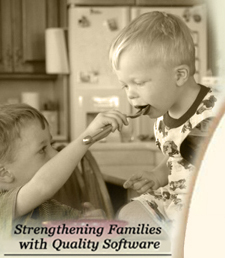
|
|
|

|
|

Steering Away From Salmonella Desiri Wightman, RD
Salmonella, a common bacteria that can cause stomach flu symptoms lurks in many places. Rarely, it finds its way into or onto eggs (1 in every 20,000 eggs is contaminated). But since you never know when you'll come across a contaminated egg, you can completely eliminate your risk of becoming infected by applying some sanitary cautions.
First, buy fresh eggs. Pay attention to the date stamped on the carton. You'll find one of two types of dates. One gives the expiration date, meaning the time by which the eggs should be used. The other gives the "sell by" date, meaning you have up to one month after that date to consume the eggs. Open the carton and take a quick view of the eggs. Any broken shells or unclean ones? If so, reach for a different carton. Choosing cartons from the back of the refrigerator case ensures that they have been subjected to less temperature fluctuations from the opening and closing of the case door.
Second, store your eggs in your refrigerator, in their original carton, preferably at the back of your appliance. Eggs absorb odors; keeping them in their original carton can hinder this sharing of flavors. Make sure your refrigerator maintains a temperature of 40° F. or less. Don't wash eggs before storing. Store-bought eggs are washed and sanitized already before packaging, and home washing can remove the shell's natural protective barrier. With this missing, bacteria can easily sneak their way in through the egg's porous shell.
Third, cook eggs thoroughly. Cooking eggs to at least 160° F. kills salmonella on the spot. When frying eggs, this means cooking the eggs until the yolk is solid . . . no more runny yolks. Many recipes, especially those published in older cookbooks, call for raw eggs in uncooked beverages, desserts, salad dressings, and so forth. If you want to be perfectly safe, especially when cooking for others, try using pasteurized eggs or egg products when making these recipes. And what about nibbling on raw cookie dough? We all do it, though we've all been warned. You'll probably be safe if you've followed the above advice. It takes salmonella about 2 hours at temperatures above 40° F. to multiply to dangerous levels in food. If you use fresh eggs and nibble at the dough within the first 30 minutes of cracking the eggs, you'll probably be okay. Just use some common sense and good judgment when nibbling or licking the spatula after that initial 30 minutes.
Fourth, keep your kitchen tidy. Salmonella can lurk on dishcloths, sponges, cutting boards, countertops, utensils, and your hands, especially after handling raw meat and poultry products. Use disposable paper towels and a bleach solution or other disinfectant to clean counters after handling raw meat and wash your dishes and hands in hot, soapy water. Prevent cross-contamination by keeping raw and cooked foods (i.e., raw chicken and fresh spinach) separate, including using separate utensils to prepare them.
Fifth, use up any cooked eggs or egg-containing leftovers within 3 days. Store them covered in the refrigerator. Store egg yolks, covered with water, in the refrigerator for up to 2 days, and use egg whites within four days. Both egg yolks and egg whites can be frozen in a deep freeze (0° F.) for up to 12 months (see Frozen Eggs and Conversions).
* DVO welcomes your kitchen hints and cooking or nutrition questions! Email us and we'll post your hints and Q/A's in upcoming newsletters! *
|
|
|














